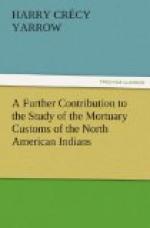and poetical custom of whispering a message in
the ear of the dead. * * * Believe that dancing
will liberate some relative’s soul from bonds
of death, and restore him to earth.
According to the same author, when a Kelta dies a little bird flies away with his soul to the spirit land. If he was a bad Indian a hawk will catch the little bird and eat him up, soul and feathers, but if he was good he will reach the spirit land. Mr. Powers also states that—
The Tolowa share in the superstitious observance for the memory of the dead which is common to the Northern Californian tribes. When I asked the chief Tahhokolli to tell me the Indian words for “father” and “mother” and certain others similar, he shook his head mournfully and said, “All dead,” “All dead,” “No good."’ They are forbidden to mention the name of the dead, as it is a deadly insult to the relatives, * * * and that the Mat-toal hold that the good depart to a happy region somewhere southward in the great ocean, but the soul of a bad Indian transmigrates into a grizzly bear, which they consider, of all animals, the cousin-german of sin.
The same author who has been so freely quoted states as follows regarding some of the superstitions and beliefs of the Modocs:
* * * It has always been one of the most passionate desires among the Modok, as well as their neighbors, the Shastika, to live, die, and be buried where they were born. Some of their usages in regard to the dead and their burial may be gathered from an incident that occurred while the captives of 1873 were on their way from the Lava Beds to Fort Klamath, as it was described by an eye-witness. Curly-headed Jack, a prominent warrior, committed suicide with a pistol. His mother and female friends gathered about him and set up a dismal wailing; they besmeared themselves with his blood and endeavored by other Indian customs to restore his life. The mother took his head in her lap and scooped the blood from his ear, another old woman placed her hand upon his heart, and a third blew in his face. The sight of the group—these poor old women, whose grief was unfeigned, and the dying man—was terrible in its sadness. Outside the tent stood Bogus-Charley, Huka Jim, Shucknasty Jim, Steamboat Frank, Curly-headed Doctor, and others who had been the dying man’s companions from childhood, all affected to tears. When he was lowered into the grave, before the soldiers began to cover the body, Huka Jim was seen running eagerly about the camp trying to exchange a two-dollar bill of currency for silver. He owed the dead warrior that amount of money, and he had grave doubts whether the currency would be of any use to him in the other world—sad commentary on our national currency!—and desired to have the coin instead. Procuring it from one of the soldiers he cast it in and seemed greatly relieved. All the dead man’s other effects, consisting of clothing, trinkets, and a half dollar, were interred with him, together with some root-flour as victual for the journey to the spirit land.
The superstitious fear Indians have of the dead or spirit of the dead may be observed from the following narrative by Swan.[106] It regards the natives of Washington Territory:




